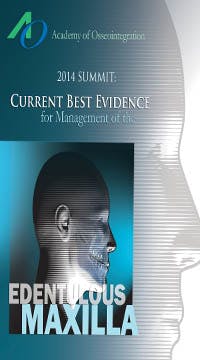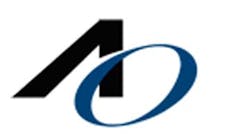Academy of Osseointegration expands current clinical practice guidelines to include management of the edentulous maxilla
The future is extremely bright for treating patients with no teeth in the upper jaw
The edentulous maxilla often presents with a range of challenges and solutions that can be difficult for individual clinicians to navigate. To help them make choices that best utilize current research—and improve the quality and efficiency of patient care—the Academy of Osseointegration (AO) has expanded its current Clinical Practice Guidelines (CPG) to include management of patients with no teeth in the upper jaw.“Advanced technology has provided dentistry with enhanced diagnostic tools, improved materials and better prosthetic options for managing the edentulous maxilla, making a growing number of patients eligible for implant therapy as opposed to the traditional denture,” said AO Board Member Clark Stanford DDS, PhD, UIC Distinguished Professor and Dean, College of Dentistry University of Illinois at Chicago. “Responsibilities for clinicians managing the edentulous maxilla have also multiplied, which is why AO sought to define the issues, develop a process, and create a model that can quickly be applied to practice.”
To arrive at these Guidelines, in August 2014 AO hosted a Consensus Summit that brought together 120 global scientists and clinicians—including representatives from the American Association of Oral and Maxillofacial Surgeons (AAOMS), the American Academy of Periodontology (AAP), and the American College of Prosthodontists (ACP)—to conduct a systematic review of the current literature, clinical information and accepted treatment approaches for management of the edentulous maxilla. Summit co-chairs were Dr. Stanford and Ole T. Jensen, DDS, MS. Committee members included Gustavo Avila-Ortiz, DDS, MS, PhD; Lyndon F. Cooper, DDS, PhD; Jeffrey Ganeles, DMD; Sree Koka, DDS, MS, PhD; and Jay P. Malmquist, DMD.
Results of this Summit, including supporting systematic reviews and detailed CPGs are now available in a special edition of the International Journal of Oral and Maxillofacial Implants (JOMI)—the official journal of the AO—Volume 31, Supplement 2016. AO members can now access this Supplement by signing into the member section of the Academy’s website: osseo.org.
“The next step is to gain approval by the National Guidelines Clearing House, which provides a formal policy-based stamp of approval to help drive adoption across the profession,” said Dr. Stanford.
The Guidelines cover five domain areas defined as: (1) role of grafting for ridge development for implant placement; (2) role of implant design and systems in management of the edentulous maxilla; (3) role of imaging to guide implant placement; (4) role of biologics to assist in ridge development; and (5) role of prosthetic management.
RELATED READING:Have infection, will travel—Paving the path to dental implant failure
These domains address key questions clinicians should consider for each specific patient, including: What is the maxillary/mandibular ridge relationship? What is the quality and quantity of available hard and soft tissue? Can the patient maintain adequate oral hygiene? Do habits or disease put this patient in an at-risk category?
“Management of the edentulous maxilla cannot be one size fits all,” said AO Board Member Tara L. Aghaloo, DDS, MD, PhD, Professor and Assistant Dean for Clinical Research, Division of Diagnostic and Surgical Services, University of California–Los Angeles School of Dentistry. “That’s why clinical practice guidelines are so important for dentistry, especially implant dentistry. Some treatment options require advanced training and skill, and should not be performed by less experienced clinicians, at least not without the proper training.”
“The future is extremely bright for the management of the edentulous maxilla, whether it is severely atrophic or not,” added Dr. Aghaloo. “It is apparent that technology will continue to improve, resulting in implants that can be loaded sooner and used in more compromised sites.”
Source: Academy of Osseointegration press release, 7 July 2016
About the Academy of Osseointegration





